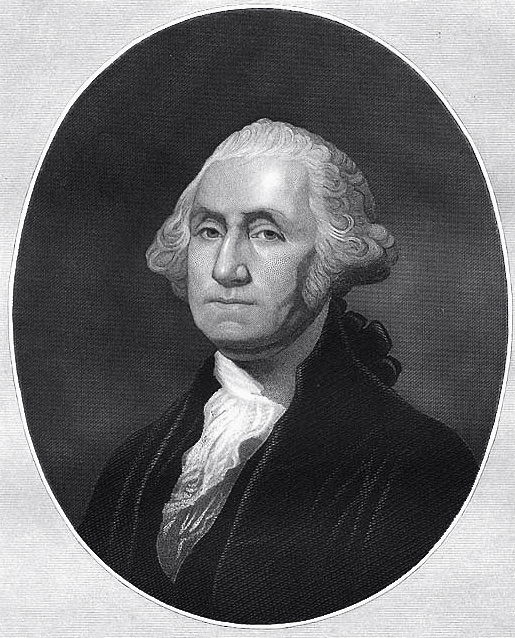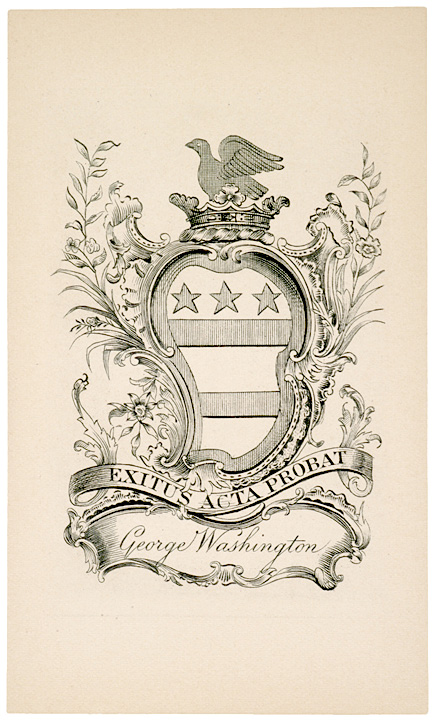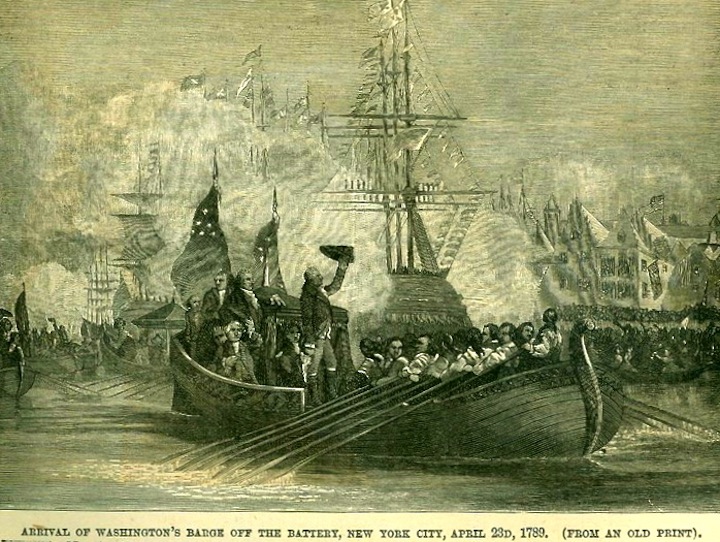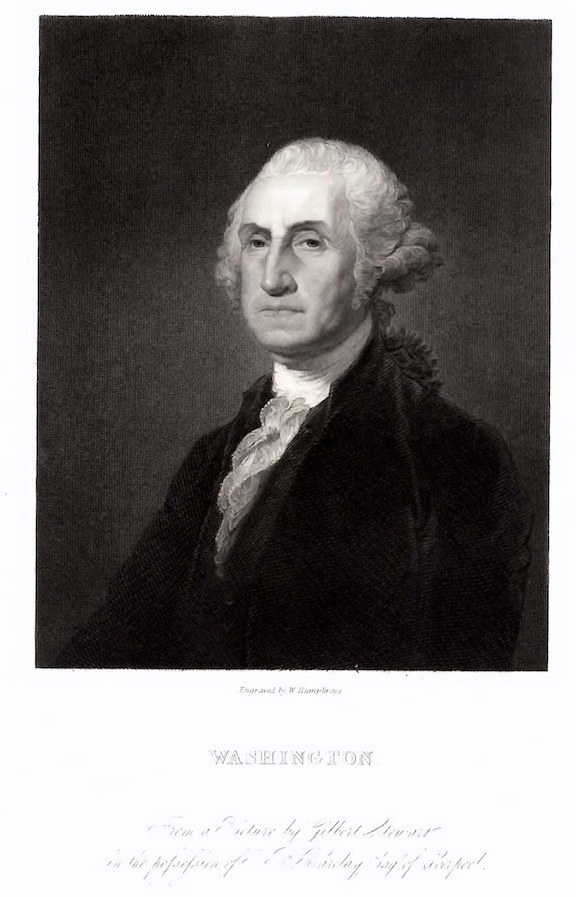************* ************* *************
************* *************

1865 Engraving of George Washington
~ RJ. Silverstein collection ~
************* ************* ************* *************
************* ************* *************
Washington wrote to General Knox on April 10th, 1789: “The cloth & buttons which accompanied your favor of the 30th Ult, came safe by Col Hanson; and really do credit to the manufacturers of this country. -As it requires six more of the large (engraved) buttons to trim the Coat in the manner I wish it to be, I would thank you, my good Sir, for procuring that number and retaining them in your hands until my arrival at New York.” It was officially recorded that General Knox employed William Rollison to chase the Arms of the United States upon a set of Gilt Buttons. These buttons were made to trim the coat that General Washington would wear on the day of his inauguration as President of the United States of America.
************* ************* *************
************* *************
The Constitution is the Supreme Law of the United States of America
The New Constitution was adopted on September 17, 1787 by the constitutional convention in Philadelphia, Pennsylvania, and then went on to be ratified by conventions in eleven states. By June of 1788, The Constitution was finally ratified by the states, and was to go into effect on March 4, 1789. By ratification, the states understand and accept that, “The Constitution is the Supreme Law of the United States of America.” In February 1789, the new nations Electoral College selected George Washington to be it’s first President. They selected the March 4,1789 as the original inauguration date to coincide with the effective date of the new constitution. Unfortunately, because of slow communication and travel, General Washington didn’t receive word early enough, and didn’t begin his journey until April 16, from his home in Mount Vernon to the City of New York (which at the time was the nations capital). His journey from Virginia took seven days, and was transformed into a triumphal procession of crowds gathering along his journey in every small town. Cities like Philadelphia, Trenton, Wilmington, Baltimore, and Alexandria turned out thousands of onlookers to shout praise for our nation’s father and hero. Every local official, and citizen wanted to meet and congratulate the most beloved man in the country, and wish him the best. Washington arrived at Elizabeth Town, New Jersey on April 23 where a ceremonial barrage awaited to take him across the river to Manhattan Island.
George Washington took his oath of office for the President of the United States on April 30th 1789, in the City of New York. The ceremony took place on the Balcony of the Senate Chamber at Federal Hall on Wall Street. General George Washington was unanimously elected by the first electoral college, and John Adams was elected Vice President because he received the second greatest number of votes. Under the rules of the time, each elector cast two votes. The Chancellor of New York, and fellow Freemason, Robert R. Livingston administered the oath of office using a bible that belonged to New York’s Saint Johns Masonic Lodge. George Washington gave the first inaugural address as the First President of the United States before a joint session of the two houses of Congress assembled inside the Senate Chamber.
************* *************
William Maclay’s eye witness account of George Washington’s inauguration
*************
”After the oath was administered on the gallery, and the cheers of the population rent the air, the company returned into the Senate chamber, the Senators and Representatives to their seats, and the President took the chair and addressed those assembled… Washington was dressed in deep brown, with metal buttons, with an eagle on them, white stockings, a bag and a sword.
“ George Washington Inaugural Buttons were made by New York, New Jersey, and Connecticut colonial button makers, and sold to the American Citizens eager to commemorate the ceremony of George Washington as President of the United States of America. It is my belief that some of these buttons may have actually been worn by those attending the ceremony on April 20, 1789. Some theories have been put forth that these buttons were also a demonstration that American manufacturing can easily replace manufactures in Birmingham England. ”
************* *************

George Washington’s First Inaugural Address
Fellow Citizens of the Senate and House of Representatives
************* ************* ************* *************
Among the vicissitudes incident to life no event could have filled me with greater anxieties than that of which the notification was transmitted by your order, and received on the 14th day of the present month. On the one hand, I was summoned by my country, whose voice I can never hear but with veneration and love, from a retreat which I have chosen with the fondest predilection, and, in my flattering hopes, with an immutable decision, as the asylum of my declining years- a retreat which was rendered everyday more necessary as well as more dear to me by the addition of habit to inclination, and of frequent interruptions in my health to the gradual waste committed on it by time. On the other hand, the magnitude and difficulty of the trust to which the voice of my country called me, being sufficient to awaken in the wisest and most experienced of her citizens a distrustful scrutiny into his qualifications, could not be overwhelm with despondence one who ( inheriting inferior endowments from nature and unpracticed in the duties of civil administration) ought to be peculiarly conscious of his own deficiencies. In this conflict of emotions all I dare aver is that it has been my faithful study to collect my duty of a just appreciation of every circumstance by which it might be affected. All I dare hope is that if, in executing this task, I have been too much swayed by a grateful remembrance of former instances, or by an affectionate sensibility to this transcendent proof of the confidence of my fellow citizens, and have thence too little consulted my incapacity as well as disinclination for the weighty and untried cares before me, and its consequences be judged my country with some share of the partiality in which they originated.
Such being the impressions under which I have, obedience to the public summons, repaired to the present station, it would be peculiarly improper to omit in this first official act my fervent supplications to that Almighty Being who rules over our universe, who presides over the councils of our nations, and whose providential aids can supply every human defect,that his benediction may concentrate to the liberties and happiness of the people of the United States a Government instituted by themselves for the essential purposes, and may enable every instrument employed in its administration to execute with success the functions allotted to his charge. In tendering to this homage to the Great Author of every public and private good, I assure myself that it expresses your sentiments not less than my own, nor those of my fellow citizens at large less then either. No people can be bound to acknowledge and adore the Invisible Hand which conducts the affairs of men more then those of the United States. Every step by which they have advanced to the character of an independent nation seems to have been distinguished by some token of providential agency; and in the important revolution just accomplished in the system of their united government the tranquil deliberations and voluntary consent of so many distinct communities from which the event has resulted can not be compared with the means by which most governments have been established without some return of pious gratitude, along with a humble anticipation of the future blessings which the past seem to presage. These reflections arising out of the present crises, have forced themselves to strongly on my mind to be suppressed. You will join with me, I trust, in thinking that there are one under the influence of which the proceedings of a new and free government can more auspiciously commence.
By the article establishing the executive department it is made the duty of the President “to recommend to your consideration such measures as he shall judge necessary and expedient.” The circumstances under which I now meet you will acquit me from entering into that subject further than to refer to the great constitutional charter under which you are assembled, and which, in defining your powers,designates the objects to which your attention is to be given. It will be more consistent with those circumstances, and far more congenial with the feelings which actuate me, to substitute, in place of a recommendation of particular measures, the tribute that is due to the talents, the rectitude, and the patriotism which adorn the characters selected to devise and adopt them. In these honorable qualifications I behold the surest pledges that as on one side no local prejudices or attachments, no separate views nor party animosities, will misdirect the comprehensive and equal eye which ought to watch over this great assemblage of communities and interests, so , on another, that the foundation of our national policy will be laid in the pure and immutable principles of private morality, and the preeminence of free government be exemplified by all the attributes which can win the affections of its citizens an command the respect of the world. I dwell on their prospect with every satisfaction which an ardent love for my country can inspire, since there is no truth more thoroughly established than that there exists in the economy and course of nature an indissoluble union between virtue and happiness; between duty and advantage; between the genuine maxims of an honest and magnanimous policy and the solid rewards of public prosperity and felicity; since we ought to be not less persuaded that the propitious smiles of Heaven can never be expected on a nation that disregards the eternal rules of order and right which Heaven itself has ordained; and since the preservation of the sacred fire o f liberty and the destiny of the republican model of government are justly considered, perhaps, as deeply, as finally, staked on the experiment entrusted to the hands of the American people.
Besides the ordinary objects submitted to your care, it will remain with your judgement to decide how far an exercise of the occasional power delegated by the with article of the Constitution is rendered expedient at the present juncture by the nature of the objections which have been urged against the system, or by the degree of inquietude which has given birth to them. Instead of undertaking particular recommendations on this subject, in which I could be guided by no lights derived from official opportunities, I shall gain give way to my entire confidence in your discernment and pursuit of the public good; for I assure myself that whilst you carefully avoid alteration which might endanger the benefits of an united and effective government, or which ought to await the future lessons of experience, a reverence for the characteristic rights of freemen and a regard for the public harmony will sufficiently influence your deliberations on the question how far the former can be impregnably fortified or the latter be safely and advantageously promoted. To the foregoing I have one to add, which will be most properly addressed to the House of Representatives. It concerns myself, and will therefore be as brief as possible. When I was first honored with a call into the service of my country, then on the eve of arduous struggle for its liberties, the light in which I contemplated my duty required that I should renounce every pecuniary compensation. From this resolution I have in no instance departed; and being still under the impressions which produced it, I must decline as inapplicable to myself any share in the personal emoluments which may be indispensably included in a permanent provision for the executive department, and must accordingly pray that the pecuniary estimates for the station in which I am placed may during my continuance in it be limited to such actual expenditures as the public good may be thought to requires.
Having thus imparted to you my sentiments as they have been awakened by the occasion which brings us together, I shall take my present leave; not without resorting once more to the benign Parent of the Human Race in humble supplication that, since He has been pleased to favor the American people with opportunities for deliberating in perfect tranquillity, and dispositions for deciding with unparalleled unanimity on a form of government for the security of their union and the advancement of their happiness, os His divine blessing may be equally conspicuous in the enlarged views. the temperate consolations, and the wise measures on which the success of this Government must depend.
************* ************* *************
1800’s Engraving of George Washington
~ RJ Silverstein collection ~
************* ************* *************
George Washington’s second inauguration took place on March 4th. 1793. This was actually the original date the Continental Congress Choose for his first inauguration. The Presidents second oath of office was administered by the Associate Justice of the Supreme Court, William Cushing; and was given in the Senate Chamber of Congress Hall in Philadelphia before an assembly of Congressmen, Cabinet Officers, Judges of the Federal and District Courts, Foreign Officials, and a small gathering of Philadelphians. President Washington gave the shortest inaugural address ever given by a President to date.
Fellow Citizens:
”I am again called upon by the voices of my country to execute the functions of its Chief Magistrate. When the occasion proper for it shall arrive, I shall endeavor to express the high sense I entertain of this distinguished honor, and of the confidence which has been reposed in me by the people of the United America.
Previous to the execution of any official act of the President the Constitution requires an oath of office. This oath I am now about to take, and in your presence: That if it shall be four during my administration of the government i have in any instance violated willingly or knowingly the injunctions thereof, I may (besides incurring constitutional punishment) be subject to the upbraiding of all who are now witnesses of the present solemn ceremony.”
************* ************* ************* *************
This is a Wonderful letter to Colonel Stone, editor of the The New York Commercial Advertiser
I have just read an article entitled, “A Half Century Reminiscence” in which was described Washington’s journey from Mount Vernon to New York when he was about to be inaugurated as the 1st President of the United States. In the closing paragraph of that communication it is asserted that Washington crossed the N. River from Paulus Hook round by 12 pilots and steered by a thirteenth. I had the felicity of being a spectator on that occasion as also his subsequent inauguration and I think I can not be mistaken when I say that Mr. Denini (who it seems was not present) was misinformed on the subject of Washington’s occupation in your city. As the smallest incidents which relate to the history of that great & good man and the organization of the constitution under we live must create a body of interest in the bosom of every true American and especially of your citizen who dwell on the spot which was in a measure consecrated by the events of that day.

I will take the liberty of stating facts as I recollect them.
“A splendid Barge having been built & fitted up for that special occasion it was manned by 13 pilots corresponding with the then number of the U.S. They were dressed in a uniform of white frocks and black caps and Commodore Nicholson acted as Coxswain or helmsmen. In this barge a committee of distinguished persons frolic fortionius proceeded to Elizabeth Town point where Washington…were received on board and was rowed majestically to the city by men whose hearts and oars were in perfect unison. A platform covered with a carpet had been laid on a score on the east side of the Coffee house ship from which a flight of steps railed and ornamented rose to the level of this wharf a military escort was in waiting with a multitude from city & country which could not be numbered filled the coffee house area, the adjacent streets and covered the tops of the houses. I shall not attempt to described the entire scene with which he was received by the multitude. Party politics found no place in the bosom and every one then felt what was afterward pronounced on the floor of Congress when his death was announced. That he was First in War – First in Peace and First in the Heart of His Country. His servants & horses having proceeded him by the way of Paulus Hook he mounted his majestic white charge – still now majestic in his own person and was escorted through Pearl Street to the Franklin house at the head of Cherry street which had been prepared for his reception and there commenced the palmy days of our federal government when the public good was the polar star and the constitution and laws the hand by which one nation ship was steered in safety through all the rocks and quicksand’s with which it was surrounded. When the civic virtues of Washington and his coadjutors carried into successful operation that admiral able system of government which the wisdom of Franklin, Madison & Hamilton and their associates in the grand convention had derived. But these bright luminaries have passed away and their mantle has not fallen on those who now fill their stating….Those suns are set – O rise some other such/Or all that we have left is empty talk/Of old achievements & despair of new.”
